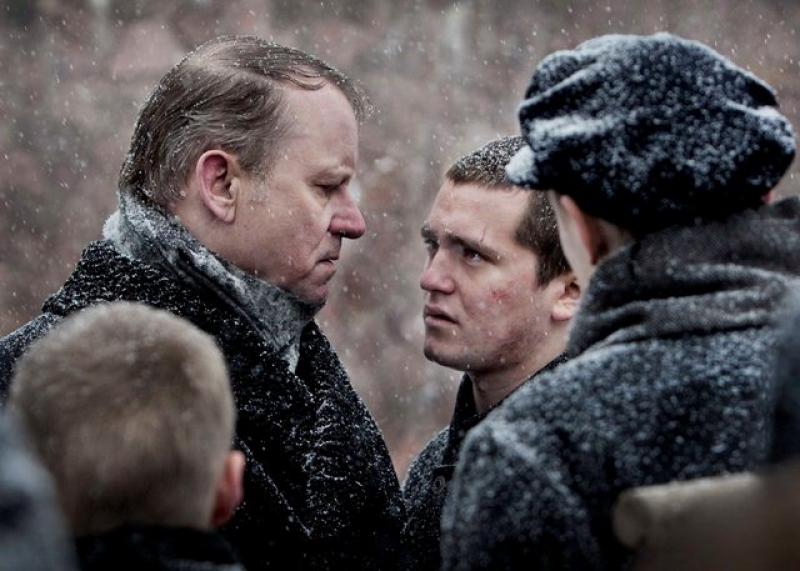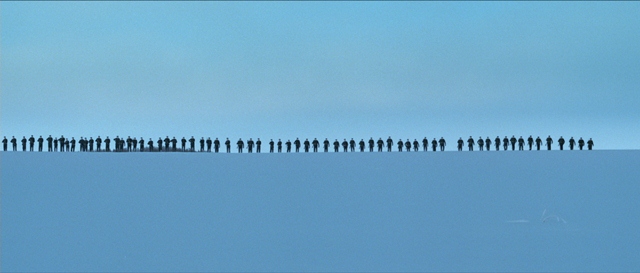King of Devil’s Island | reviews, news & interviews
King of Devil’s Island
King of Devil’s Island
Bleak Norwegian prison drama based on real events

Although tinged throughout with blue, the Norwegian drama King of Devil’s Island is so grim it might as well be grey. Basing it on real events pitches the film as a cautionary tale, but the message is hard to determine. Everything shies away from explanation. Norwegians might have the context, but the rest of us need to fill in the gaps.
Although filmed in Estonia, King of Devil’s Island (Kongen av Bastøy) is set on the island of Bastøy, at the seaward end of the Oslo fjord. Currently, the mile-square island is in use as a prison held as a model of humane rehabilitation. In 1915 it was a facility to which delinquent boys were despatched. The board running it drew its members from schools and the church. Back then, the inmates rose against those holding them there. The uprising was perceived as so serious that a battle-ready army squadron was sent by warship to deal with it (depicted stunningly in the film, with the horizon filled by soldiers, pictured below). According to the film, the spark that ignited the uprising was the abuse of inmates by the prison’s staff.
It’s hard to watch without thinking about Anders Breivik’s attack on the island of Utøya
This isn’t a prison-break drama like Escape from Alcatraz, but it does have echoes of Lord of the Flies. Erling (Benjamin Helstad) arrives by boat. He has worked on whaling ships and has been charged with murder. The new inmate is shorn of his hair and stripped naked, after which he has to march through the island’s massed boys in sub-zero temperatures to get his uniform. He’s also stripped of his identity and renamed C-19, the letter coming from the block where he’s billeted.
Bastøy is run by Bestyreren, played with ice-block rigour by Stellan Skarsgård. He says “discipline without compassion is cruel”. One boy has been on the island for six years. He stole from a church collection box at age 11. The governor is all about rules and order, but is revealed to have a tortured relationship with his younger wife, who lives on the island with him – she roams free with her dogs. Day-to-day affairs are handled by the fearsome Bråthen (Kristoffer Joner). He also has a secret. He’s sexually abusing vulnerable children, the discovery of which leads Erling to give the other boys the courage to fight back.
 Recognisable devices are adopted. Erling bonds with a fellow inmate, there’s a washroom fight, one of the boys is deeply sensitive so a target. Erling tells metaphorical stories (about his life in whaling), a contrivance that is overused. The heart of the film is the battle of wills between Bestyreren and Erling, with Bråthen’s transgressions usefully there to feed this struggle. Both Skarsgård and Helstad play with an intensity that looks migraine-inducing. There’s no light and shade, making King of Devil’s Island a bruising experience.
Recognisable devices are adopted. Erling bonds with a fellow inmate, there’s a washroom fight, one of the boys is deeply sensitive so a target. Erling tells metaphorical stories (about his life in whaling), a contrivance that is overused. The heart of the film is the battle of wills between Bestyreren and Erling, with Bråthen’s transgressions usefully there to feed this struggle. Both Skarsgård and Helstad play with an intensity that looks migraine-inducing. There’s no light and shade, making King of Devil’s Island a bruising experience.
You’re left wondering about the film's purpose. Why was it made almost a century on from these events? The uprising took place shortly after the outbreak of World War I. It’s tempting to view the film as an allegory about Norway using the Bastøy rebellion as displacement for their position on the war – the country was not going to fight other nations, so it turned on itself, fought its own. Why does Skarsgård, a Swedish actor whose ambivalent views on religion are well known, play the governor of Norwegian prison overseen by the church? Although first screened in 2010, it’s also hard to watch King of Devil’s Island without thinking about Anders Breivik’s 2011 attack on the island of Utøya. However you see this film, it’s more than a simple thriller.
Watch the trailer for King of Devil’s Island
The future of Arts Journalism
You can stop theartsdesk.com closing!
We urgently need financing to survive. Our fundraising drive has thus far raised £49,000 but we need to reach £100,000 or we will be forced to close. Please contribute here: https://gofund.me/c3f6033d
And if you can forward this information to anyone who might assist, we’d be grateful.

Subscribe to theartsdesk.com
Thank you for continuing to read our work on theartsdesk.com. For unlimited access to every article in its entirety, including our archive of more than 15,000 pieces, we're asking for £5 per month or £40 per year. We feel it's a very good deal, and hope you do too.
To take a subscription now simply click here.
And if you're looking for that extra gift for a friend or family member, why not treat them to a theartsdesk.com gift subscription?
more Film
 Steve review - educator in crisis
Cillian Murphy excels as a troubled headmaster working with delinquent boys
Steve review - educator in crisis
Cillian Murphy excels as a troubled headmaster working with delinquent boys
 Can I get a Witness? review - time to die before you get old
Ann Marie Fleming directs Sandra Oh in dystopian fantasy that fails to ignite
Can I get a Witness? review - time to die before you get old
Ann Marie Fleming directs Sandra Oh in dystopian fantasy that fails to ignite
 Happyend review - the kids are never alright
In this futuristic blackboard jungle everything is a bit too manicured
Happyend review - the kids are never alright
In this futuristic blackboard jungle everything is a bit too manicured
 Robert Redford (1936-2025)
The star was more admired within the screen trade than by the critics
Robert Redford (1936-2025)
The star was more admired within the screen trade than by the critics
 Blu-ray: The Sons of Great Bear
DEFA's first 'Red Western': a revisionist take on colonial expansion
Blu-ray: The Sons of Great Bear
DEFA's first 'Red Western': a revisionist take on colonial expansion
 Spinal Tap II: The End Continues review - comedy rock band fails to revive past glories
Belated satirical sequel runs out of gas
Spinal Tap II: The End Continues review - comedy rock band fails to revive past glories
Belated satirical sequel runs out of gas
 Downton Abbey: The Grand Finale review - an attemptedly elegiac final chapter haunted by its past
Noel Coward is a welcome visitor to the insular world of the hit series
Downton Abbey: The Grand Finale review - an attemptedly elegiac final chapter haunted by its past
Noel Coward is a welcome visitor to the insular world of the hit series
 Islands review - sunshine noir serves an ace
Sam Riley is the holiday resort tennis pro in over his head
Islands review - sunshine noir serves an ace
Sam Riley is the holiday resort tennis pro in over his head
 theartsdesk Q&A: actor Sam Riley on playing a washed-up loner in the thriller 'Islands'
The actor discusses his love of self-destructive characters and the problem with fame
theartsdesk Q&A: actor Sam Riley on playing a washed-up loner in the thriller 'Islands'
The actor discusses his love of self-destructive characters and the problem with fame
 Honey Don’t! review - film noir in the bright sun
A Coen brother with a blood-simple gumshoe caper
Honey Don’t! review - film noir in the bright sun
A Coen brother with a blood-simple gumshoe caper
 The Courageous review - Ophélia Kolb excels as a single mother on the edge
Jasmin Gordon's directorial debut features strong performances but leaves too much unexplained
The Courageous review - Ophélia Kolb excels as a single mother on the edge
Jasmin Gordon's directorial debut features strong performances but leaves too much unexplained

Add comment